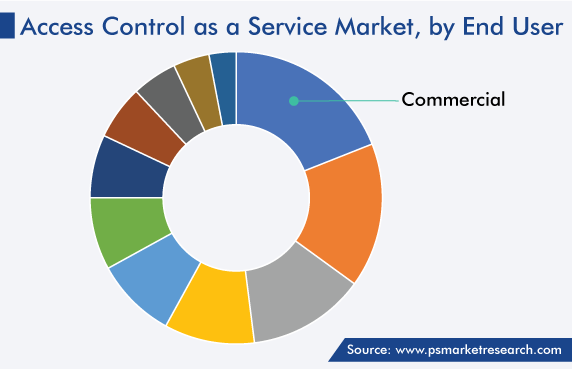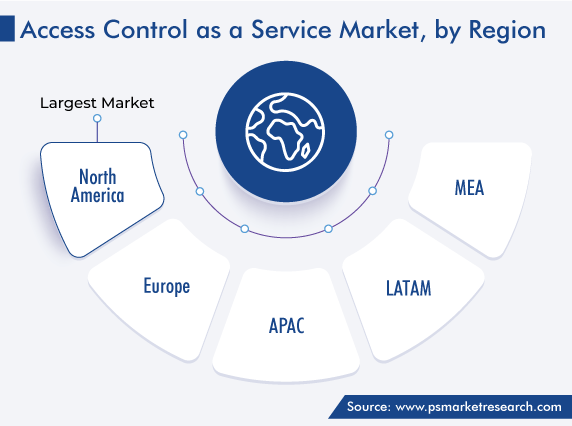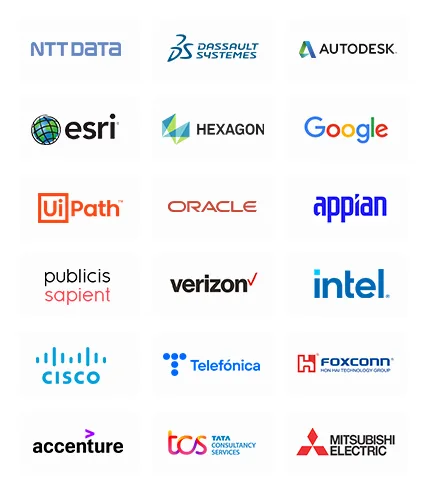Market Statistics
| Study Period | 2019 - 2030 |
| 2024 Market Size | USD 1,391.3 Million |
| 2030 Forecast | USD 3,239 Million |
| Growth Rate(CAGR) | 15.1% |
| Largest Region | North America |
| Fastest Growing Region | Asia-Pacific |
| Nature of the Market | Fragmented |
Report Code: 12603
Get a Comprehensive Overview of the Access Control as a Service (ACaaS) Market Report Prepared by P&S Intelligence, Segmented by Access Control Models (MAC, RBAC, DAC, RB-RBAC, Attribute Based Access Control, Risk Adaptive Access Control, Identity Based Access Control), Service Type (Managed, Hosted, Hybrid), Deployment (Public, Private, Hybrid), End User (Pharmaceuticals, Commercial, Education, Government, Health care, Hospitality, Industrial, Manufacturing, Retail, Transportation), and Geographic Regions. This Report Provides Insights from 2019 to 2030.
| Study Period | 2019 - 2030 |
| 2024 Market Size | USD 1,391.3 Million |
| 2030 Forecast | USD 3,239 Million |
| Growth Rate(CAGR) | 15.1% |
| Largest Region | North America |
| Fastest Growing Region | Asia-Pacific |
| Nature of the Market | Fragmented |

Explore the market potential with our data-driven report
The access control as a service market size stood at USD 1,391.3 million in 2024, and it is expected to witness a compound annual growth rate of 15.1% between 2024 and 2030, to reach USD 3,239 million by 2030.
AcaaS is the combination of on-premises access control devices and software as a service, allowing users to utilize different services and web applications from anywhere. The primary goal is to protect assets by allowing or restricting unwanted entities from gaining entry to a restricted premises. AcaaS is significantly less expensive than legacy access control because all the information is stored on remote servers, thus eliminating the need for the servers to be installed on the site.
ACaaS is used in a variety of industries to verify and empower users, thereby increasing the physical security of various facilities. Administrators can control the IT infrastructure hosted on the internet with ACaaS. It gives them access to a lot of features, including the ability to authenticate and authorize users and support for the Windows Identity Foundation, popular web identity access control services, and a lot of other platforms and services. Access control as a service is used in warehouses, parking garages, hotels, and education institutes. Video intercom, swipe cards, and alarm systems are some of the devices via which this technology is deployed.
The continuously growing economy, end users’ desires to do more with their access control systems, increasing interest of enterprises in new technologies, rising adoption of the BYOD policy in IT enterprise, growing awareness about sophisticated data security threats, and government funding for cybersecurity all have a positive impact on the sector.
COVID-19 also had a positive impact on the market, as companies accelerated their digital transformation, and cybersecurity was a major concern. Employees have been encouraged to work from home as a result of the restrictions imposed by governments in response to the coronavirus pandemic. As a result, technology has grown in importance in the personal and professional lives. Companies have adopted online productivity and collaboration services as a result of the pandemic, which has emphasized how important cloud computing is for business continuity, with remote workforces. This has also led to an increase in cyber threats, which is why businesses have implemented access control services as part of their cybersecurity initiatives.
The BYOD culture is gaining popularity, and BaaS providers have invested a significant amount of money to promote this trend. BYOD initiatives allow employees working on their own devices at the workplace access to corporate emails and all kinds of documents through phones and tablets. Organizations all over the world are producing more data as a result of this culture.
Employers are increasingly adopting the BYOD model for a variety of reasons, including increased productivity, higher job satisfaction, and more employee retention. This can be a result of the increased comfort and speed of work employees experience on their own devices and the incorporation of cutting-edge technologies into the workplace without significant investments in hardware, software licensing, or device maintenance.
In a recent survey, 61% of the Gen Y people and 50% of the workers over 30 years old said that the technology tools they use in their personal lives are more productive and effective than those they use at work. In addition, the COVID-19 pandemic helped spread the BYOD popularity, by enforcing the WFH culture.
Technological advancements have significantly increased the risks to data privacy and security, one of which is system outages due to data breaches. System downtime is not an option in the modern world because it could be disastrous for brands. In addition, after a data breach, the costs associated with legal actions and claims rise. Regulatory issues, such as failing to protect information under the General Data Protection Regulation (GDRP), can further lead to massive fines. According to the Data Breach Investigations Report, over 90% of the cyberattacks are caused by human error, which can both lead to and heighten the risk of cybercrime and the harm posed to enterprises.
Creating a culture of risk awareness in the workplace, which begins with the awareness of cybersecurity, is the most-effective strategy for corporations to combat this threat. Keeping systems safe and the data secure is a significant challenge for enterprises. Hence, the increasing concerns about data security are driving the demand for ACaaS.
Among all the service types in the access control as a service market, the hosted category held the largest share in 2022. Hosted ACaaS software runs on remote hardware maintained by the owner of the server; therefore, users need not pay for their maintenance.
Additionally, monitoring and managing all access control activities save time and money when a third party can update users' access rights. It means that users only have to pay for the services they choose. In addition, the commercial, residential, government, and healthcare sectors are increasingly demanding hosted services.
The hybrid service category would witness the second-highest growth rate during the forecast period. Hybrid services help in improving threat visibility and immediately responding to attacks, thus also ensuring compliance with the government standards. Most of the small and big entities are deploying hybrid solutions as they allow users to work between two interconnected networks of the public and private clouds. Moreover, hybrid platforms can be customized to serve specific needs and help companies smoothen their operations.
In 2022, the commercial category held the largest market share, and it is expected to grow at a CAGR of more than 19% during the forecast period, attributed to an increase in the count of robberies and thefts at commercial buildings. In order to safeguard business assets, property owners are purchasing security systems via the ACaaS approach for remote monitoring. Companies already spend millions of dollars on security, to make their facilities safer, keep people safe, and solve problems in security.
Moreover, due to the rising demand for high-level surveillance and monitoring systems, the residential sector is expected to experience significant growth in the coming years, along with the commercial sector.
Moreover, the retail sector is expected to grow with the second-highest CAGR in the future. In the retail sector, ensuring workplace safety, preventing business interruptions, and reducing final losses play an important role. The boom of the population and growth in the urbanization rate are fueling the development of malls, thus driving the overall retail sector. Moreover, governments are taking initiatives to develop the retail sector in their respective countries.
For instance, the central government of India has allowed 100% FDI in the online retail of products and services via the automatic route. Investing in access control as a service is necessary for long-term benefits, such as the maximization of store profits and reduction of losses. As retail stores and malls are prone to burglaries and robberies, access control services are being availed of to make them secure.

Drive strategic growth with comprehensive market analysis
Due to the growing demand for effective access control services to improve security systems in various commercial spaces, North America dominates the market for ACaaS with a market share of around 44%. In this regard, the rapid expansion of the regional market is driven by the rising rates of crimes, such as burglaries and B&Es.
The high expenditure on wireless security solutions is also attributed for this dominance. The preference for wireless access management systems is being propelled by the developed surveillance infrastructure in the region. A mobile-based access management system is needed because smartphones are used by everyone in the U.S. The market is also expanding as a result of the widespread use of IoT-based systems and cloud computing. As cloud computing enables organizations to become more flexible, resilient, and agile, it is becoming the norm for businesses in the continent, to deliver business value regardless of application or workload.
The majority of the businesses in North America use hybrid or multi-cloud solutions, which account for 94% and 87% of all the cloud deployments, respectively.

Due to the growing demand for security solutions, the Asia-Pacific region holds the second-largest share, and it will experience significant market expansion. Data and asset security are in high demand as industrialization quickens. Similarly, security concerns drive the need for surveillance systems in residential areas, as a result of the rapid urbanization. For instance, the People’s Government has chosen 200 cities for smart city projects, including Beijing, Shanghai, Guangzhou, and Hangzhou. In the same way, a greenfield smart city project in South Korea, named Songdo International Business District, is being developed close to Incheon.
Based on Access Control Models
Based on Service Type
Based on Deployment
Based on End User
Geographical Analysis
In 2030, the market for ACaaS will generate USD 3,239 million.
Hosted services are the most popular in the ACaaS industry.
The BYOD culture is a key trend in the market for ACaaS.
The commercial sector holds the largest ACaaS industry share.
North America is the largest market for ACaaS.
Want a report tailored exactly to your business need?
Request CustomizationLeading companies across industries trust us to deliver data-driven insights and innovative solutions for their most critical decisions. From data-driven strategies to actionable insights, we empower the decision-makers who shape industries and define the future. From Fortune 500 companies to innovative startups, we are proud to partner with organisations that drive progress in their industries.


Working with P&S Intelligence and their team was an absolute pleasure – their awareness of timelines and commitment to value greatly contributed to our project's success. Eagerly anticipating future collaborations.
McKinsey & Company
IndiaOur insights into the minutest levels of the markets, including the latest trends and competitive landscape, give you all the answers you need to take your business to new heights
We take a cautious approach to protecting your personal and confidential information. Trust is the strongest bond that connects us and our clients, and trust we build by complying with all international and domestic data protection and privacy laws
Customize the Report to Align with Your Business Objectives
Request the Free Sample Pages